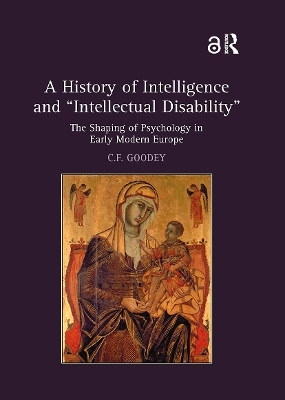
A History of Intelligence and 'Intellectual Disability'
Routledge (Verlag)
978-1-032-92069-6 (ISBN)
Starting with the hypothesis that not only human intelligence but also its antithesis 'intellectual disability' are nothing more than historical contingencies, C.F. Goodey's paradigm-shifting study traces the rich interplay between labelled human types and the radically changing characteristics attributed to them. From the twelfth-century beginnings of European social administration to the onset of formal human science disciplines in the modern era, A History of Intelligence and 'Intellectual Disability' reconstructs the socio-political and religious contexts of intellectual ability and disability, and demonstrates how these concepts became part of psychology, medicine and biology. Goodey examines a wide array of classical, late medieval and Renaissance texts, from popular guides on conduct and behavior to medical treatises and from religious and philosophical works to poetry and drama. Focusing especially on the period between the Protestant Reformation and 1700, Goodey challenges the accepted wisdom that would have us believe that 'intelligence' and 'disability' describe natural, trans-historical realities. Instead, Goodey argues for a model that views intellectual disability and indeed the intellectually disabled person as recent cultural creations. His book is destined to become a standard resource for scholars interested in the history of psychology and medicine, the social origins of human self-representation, and current ethical debates about the genetics of intelligence.
The Open Access version of this book, available at http://www.taylorfrancis.com/books/e/9781315564838, has been made available under a Creative Commons Attribution-Non Commercial-No Derivatives 4.0 license.
C.F. Goodey has researched and published on the history of 'intellectual disability', including the ethical and social implications of the concept, for more than 20 years. His articles have appeared in a number of scholarly journals, including History of Science, Medical History, History of the Human Sciences, Political Theory and Ancient Philosophy. He formerly held teaching and research posts at Ruskin College, Oxford, the Open University and the University of London Institute of Education, and is currently an independent consultant working for national and local government services on learning disability in the UK.
Contents: Introduction; Part 1 Problematical Intellects in Ancient Greece: Ancient philosophy and the 'worst disability'; Aristotle and the slave's intellect. Part 2 Intelligence and Disability: Socio-Economic Structures: The speed of intelligence: fast, slow and mean; Quick wit and the ingenious gentleman. Part 3 Intelligence and Disability: Status and Power: In-group and out-group: the place of intelligence in anthropology; Honour, grace and intelligence: the historical interplay; 'Souls drowned in a lump of flesh': the excluded. Part 4 Intelligence, Disability and Honour: Virtue, blood, wit: from lineage to learning; 'Dead in the very midst of life': the dishonourable and the idiotic. Part 5 Intelligence, Disability and Grace: From pilgrim's progress to developmental psychology; The science of damnation: from reprobate to idiot. Part 6 Fools and Their Medical Histories: The long historical context of cognitive genetics; The brain of a fool; A first diagnosis? The problem with pioneers. Part 7 Psychology, Biology and the Ethics of Exceptionalism: Philosophy, the devil and 'special people'; The wrong child: changelings and the bereavement analogy; Testing the rule of human nature: classification and abnormality. Part 8 John Locke and his Successors: the historical contingency of disability; Works cited; Index.
| Erscheinungsdatum | 16.10.2024 |
|---|---|
| Verlagsort | London |
| Sprache | englisch |
| Maße | 174 x 246 mm |
| Gewicht | 453 g |
| Themenwelt | Geisteswissenschaften ► Archäologie |
| Geisteswissenschaften ► Geschichte | |
| Studium ► Querschnittsbereiche ► Geschichte / Ethik der Medizin | |
| ISBN-10 | 1-032-92069-6 / 1032920696 |
| ISBN-13 | 978-1-032-92069-6 / 9781032920696 |
| Zustand | Neuware |
| Informationen gemäß Produktsicherheitsverordnung (GPSR) | |
| Haben Sie eine Frage zum Produkt? |
aus dem Bereich


